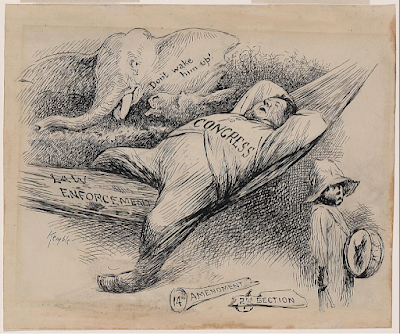Cartoon shows Congress as a fat man asleep in a hammock labeled "Law Enforcement." A broken blunderbuss, labeled "14th Amendment, 2nd Section," lies at his feet. A small black boy walks by holding a drum, but an elephant cautions, "Don't wake him up!" The drawing was by E. W. Kemble who illustrated the first edition of the Mark Twain satire on entrenched attitudes, such as racism, Adventures of Huckleberry Finn, in 1884.
by Mark Twain
On
July 9, 1868, The 14th Amendment to the U.S. Constitution was ratified.
The amendment was designed to grant citizenship to and protect the
civil liberties of recently freed slaves. It did this by prohibiting
states from denying or abridging the privileges or immunities of
citizens of the United States, depriving any person of his life,
liberty, or property without due process of law, or denying to any
person within their jurisdiction the equal protection of the laws.
On December 3, 1865, a group of Black Mississippians wrote to the state’s governor, demanding respect for their newly won freedom. “Now we are free,” they insisted, “we do not want to be hunted … All we ask is justice and to be treated like humane beings.” They recalled vividly “the yelping of bloodhounds and tareing of our fellow servants To pisces” by slave patrols, and called for an end to these violent abuses. The Fourteenth Amendment, written the next year and ratified in 1868, vindicated their demands for equal justice, human dignity, and bodily security.
Considered one of the most consequential amendments, it addresses citizenship
rights and equal protection under the law at all levels of government.
The Fourteenth Amendment was a response to issues affecting freed slaves following the American Civil War, and its passage was bitterly contested. States of the defeated Confederacy were required to ratify it to regain representation in Congress.
The amendment, particularly its first section, is one of the most
litigated parts of the Constitution, forming the basis for landmark Supreme Court decisions,
Viewfinder links:
Minoo Hamzavi ~
Net links:
The Atlantic ~ 14th Amendment = Protection Against State Violence
National Woman's History Museum ~ 14th and 15th Amendments


No comments:
Post a Comment
PLEASE NOTE: comments are moderated BEFORE they are posted so DO NOT appear immediately.
Thank you.